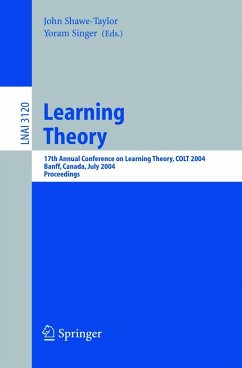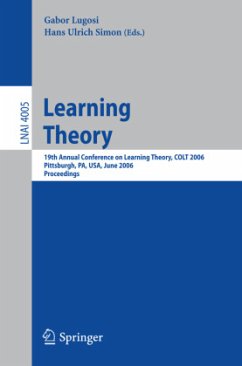
Anticipatory Behavior in Adaptive Learning Systems
Foundations, Theories, and Systems
Herausgegeben: Butz, Martin V.; Sigaud, Olivier; Gérard, Pierre

PAYBACK Punkte
20 °P sammeln!
The interdisciplinary topic of anticipation, attracting attention from computer scientists, psychologists, philosophers, neuroscientists, and biologists is a rather new and often misunderstood matter of research. This book attempts to establish anticipation as a research topic and encourage further research and development work.
First, the book presents philosophical thoughts and concepts to stimulate the reader's concern about the topic. Fundamental cognitive psychology experiments then confirm the existence of anticipatory behavior in animals and humans and outline a first framework of anticipatory learning and behavior. Next, several distinctions and frameworks of anticipatory processes are discussed, including first implementations of these concepts. Finally, several anticipatory systems and studies on anticipatory behavior are presented.
First, the book presents philosophical thoughts and concepts to stimulate the reader's concern about the topic. Fundamental cognitive psychology experiments then confirm the existence of anticipatory behavior in animals and humans and outline a first framework of anticipatory learning and behavior. Next, several distinctions and frameworks of anticipatory processes are discussed, including first implementations of these concepts. Finally, several anticipatory systems and studies on anticipatory behavior are presented.
The matter of anticipation is, as the editors of this volume state in their preface, a rathernewtopic. Giventhealmostconstantusewemakeofanticipationin our dailyliving,itseemsoddthatthebulk ofpsychologistshavepersistentlyignored it. However, the reason for this disregard is not di?cult to ?nd. The dogma of the scienti?c revolution had from the outset laid down the principle that future conditions and events could not in?uence the present. The law of causation clearly demands that causes should precedetheir e?ects and, therefore,concepts such as purpose, anticipation, and even intention were taboo because they were thought to involve things and happenings that lay ahead in time. An analysis of the three concepts purpose, anticipation, and intention shows that they are rooted in the past and transcend the present only insofar as they contain mental representations of things to be striven for or avoided. Purposiveorgoal-directedactioncouldbe circumscribedasactioncarriedoutto attain something desirable. In each case, the particular action is chosenbecause, in the past, it has more or less reliably led to the desired end. The only way the future is involved in this procedure is through the belief that the experiential worldmanifestssomeregularityandallowsthelivingorganismtoanticipatethat what has workedin the past will continue to work in the future. This belief does not have to be conscious. Skinner s rats continued to turn left in a maze where theleftarmhadbeenbaited. Theydidsobecausethemeatpelletthey foundthe ?rst time had reinforced them to repeat the turn to the left.














